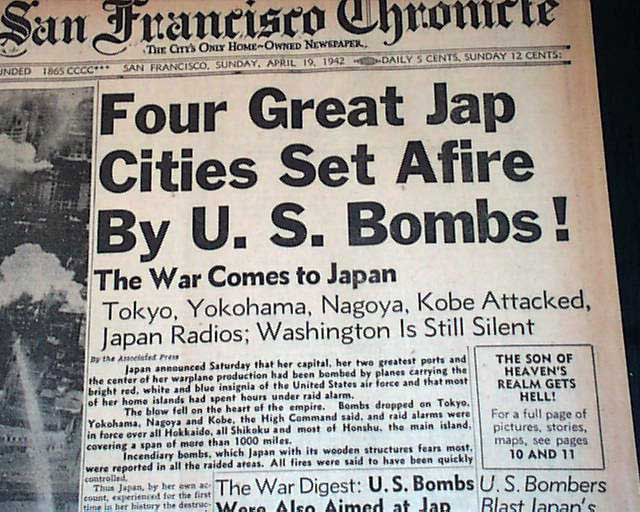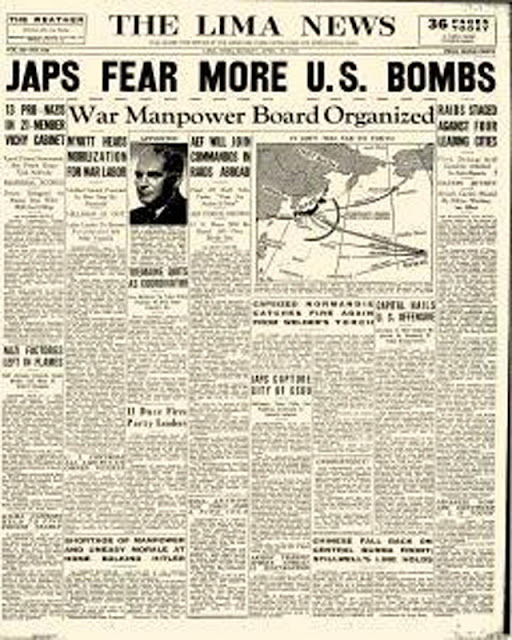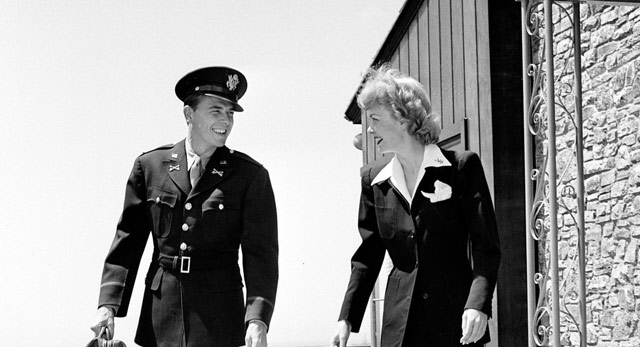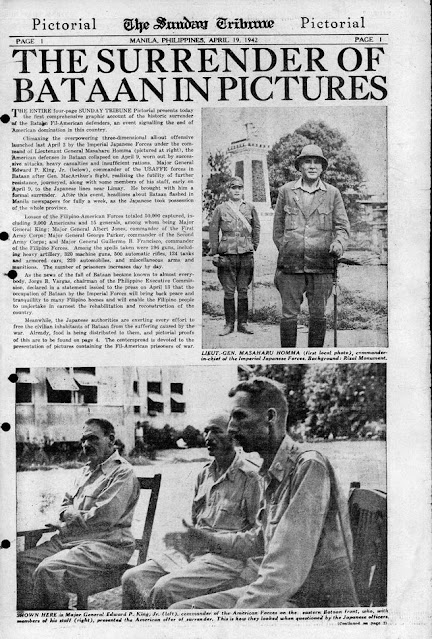Sunday 19 April 1942
 |
| USS Nevada leaves Pearl Harbor for a trial run on April 19, 1942, after hurried repairs from the 7 December 1941 air raid (U.S. Navy). |
Battle of the Pacific: The Doolittle raiders end their mission in the early morning hours of 19 April 1942 by crashing in China or ditching their B-25 bombers in the sea. Ultimately, 15 of the 16 planes are destroyed in crashes. One crew lands near Vladivostok, Russia, where the crew is interned because the USSR is not at war with Japan (they escape in 1943). The Japanese capture eight crewmen, of whom three are executed as "war criminals." One crewman dies of disease in prison. Most of the remaining crewmen are helped by Chinese civilians and manage to return home via Burma and India. Colonel Doolittle, who lands in a rice paddy near Chun Chow and is helped by local civilians, is promoted (in absentia) to Brigadier General.
The Japanese search hard for the Doolittle crews and while doing so execute an estimated 250,000 Chinese civilians in reprisal. In Tokyo, the raid takes the military command by surprise and alarms it even though the attack actually caused little damage. The danger is that it has exposed shortcomings in the sea "outfield" defensive perimeter. It recalls some units to the home islands for defense and beefs up sea patrols. Admiral Yamamoto speeds up spans for the invasion of Midway in order to provide better security on the sea approaches to Japan. Because the life of the Emperor was placed in jeopardy by the raid, the official position is that it is unpatriotic to argue against the adoption of a more defensive strategy.
In Washington, D.C., there are wild rumors of a raid (due to Japanese radio reports that "Enemy bombers appeared over Tokyo for the first time in the current war"), but the White House and War Department issue no statements. President Roosevelt is in Hyde Park, New York, and finally is informed about the raid. Advisor Samuel Rosenman suggests that if any reporters ask where the raid originated, he could tell them it came from "Shangri-La," a fantasy Himalayan city in James Hilton's novel "Lost Horizon."
In the Philippines, the Japanese complete the capture of Cebu Island. A Japanese submarine shells and sinks 1406-ton Philippine freighter El Cano off Corregidor. The Japanese lose guard boat No. 21 Nanshin Maru (scuttled) and No. 1 Iwate Maru (sinks) as a result of the air attacks from the USS Enterprise in preparation for the Doolittle raid.
 |
| The press is full of reports of a daring air raid on Japan, but there is no official word yet and the details are only provided by Japanese radio broadcasts. San Francisco Chronicle, 19 April 1942. |
Battle of the Indian Ocean: The British 1st Burma Division, about 7000 men, crosses the Pin Chaung River in Burma on 19 April 1942, meeting up with an advancing Chinese relief column. The Chinese attack at 08:00 and make little progress, but attack again in the afternoon and make contact with the British around 16:00 after the Japanese pull back to the south and east. The British under the command of Captain J.A. Clifford thereby avoid being trapped and save the troops. Clifford stays in the vicinity to collect stragglers, some of whom have escaped after being captured.
The Chinese leader, General Lo Cho-Ying, had refused to rescue the British, but subordinate commander General Sun Li-Jen responded favorably to a telephone appeal from British commander Major General James Bruce Scott and led 1121 men to help the British. The 1st Burma Division is in poor condition, having lost its heavy equipment and with many Burmese troops having deserted. King George VI will award General Sun with the Commander of the Order of the British Empire medal and also some of his subordinate commanders with other awards. The Chinese remain in the area to attack south toward the Yenangyaung oil fields but face heavy Japanese opposition. All told, the Japanese have lost 700 killed in the battle around the Yenangyoung oil fields while the Allies have lost roughly 550 men - and control of the installation.
 |
| A Finnish Second Lieutenant takes a break, April 1942 (SA-Kuva). |
Eastern Front: Lieutenant General Mikhail Grigoryevich Yefremov, commander of the Soviet 33rd Army, commits suicide to avoid being taken prisoner by the Germans near Vyazma. He does so while personally leading a failed breakout attempt across a highway out of a pocket south and east of Smolensk that had formed during a Soviet attempt to take Vyazma in February 1942. The Germans had found a copy of orders for the breakout in the uniform of a dead Soviet soldier and were ready and waiting at the crossing point. They form three lines of defense at the road and destroy the remnants of the 33rd Army with withering machine-gun and artillery fire.
A separate breakout attempt by General Pavel Belov's 1st Guards Cavalry Corps from the Smolensk/Vyazma pocket is undetected by the Germans and succeeds in crossing the road to reach the Soviet 10th Army. A monument to Yefremov is later placed in Vyazma and he posthumously is awarded the Order of the Red Banner. Belov, on the other hand, gains greatly in prestige and soon will be awarded command of the 61st Army.
In Crimea, the battles along the Parpach Narrows have died down, but the Luftwaffe is making its enhanced presence known. Today, German bombers damage tanker I. Stalin along with three other transport ships. General Manstein has managed to keep his casualties relatively low during the battles while General Kozlov's Crimean Front has lost 40% of its manpower, 52% of its tanks, and 25% of its artillery during its failed offensives. Manstein now begins planning a final offensive (Unternehmen Trappenjagd or "Bustard Hunt") to clear the Soviets out of the Kerch Peninsula once the spring thaw arrives in early May. The Soviet Stavka asks Stalin to consider withdrawing from the exposed position but the commander in chief is undecided.
Near Demyansk, General Seydlitz's relief force continues slowly grinding toward the pocket where almost 100,000 German troops are trapped. The Soviets are resisting bitterly but have nowhere to retreat between the relief column and the Lovat River. General Halder notes casually in his war diary, "Still all quiet on the front."
 |
| A Hitler Youth induction ceremony for ten-year-olds in Berlin, 19 April 1942 (Federal Archive Image 183-J01181). |
European Air Operations: It is a quiet day on the Channel Front. The only activity is minelaying overnight in the Frisian Islands, during which the RAF loses one Hampden and one Wellington bomber.
Battle of the Atlantic: U-130 (KrvKpt. Ernst Kals) shells the Royal Dutch Shell refineries at Ballen Bay on Curacao in the Netherlands West Indies. A total of twelve shells cause minimal damage.
U-136 (Kptlt. Heinrich Zimmermann) torpedoes and sinks armed US freighter Steel Maker west of Bermuda. The submarine stops to question the survivors in their life boats, and Captain politely says, "I am sorry to have to sink you and do this to you, but this is war." He promises to inform the Allies of their position. Although only one crewman perishes and 36 men survive, the survivors drift in the current and the last man is not rescued until 18 May 1942. (Sources conflict on U-136's activities today but this is according to the US Navy Chronology).
U-136 also torpedoes and damages freighter Axtell J. Byles (named for a football player) off Wimble Shoals, North Carolina. The tanker makes it to Hampton Roads under its own power with no injuries to the crew.
German auxiliary cruiser Michel (formerly Polish freighter Bielsko and then hospital ship Bonn), under the command of FK (later KzS) Helmuth von Ruckteschell, shells and sinks 7468-ton British tanker Patella in the South Atlantic. There are five dead. The Germans take 60 crewmen as prisoners. This is Michel's first victory after breaking out through the English Channel and sailing on 20 March 1942.
US 7500-ton freighter Exminster collides with freighter Algic at the entrance to Cape Cod Canal, Cape Cod Bay, Massachusetts, and sinks. Algic suffers minimal damage. Exminster later is raised and towed to New York but ultimately scrapped in 1946.
US Navy destroyer Broome (DD-210) rescues 27 survivors from freighter Alcoa Guide, sunk by U-123 on 16 April 1942.
Convoy PQ-14 arrives at Murmansk, USSR.
 |
| The Lima, Ohio, News headlines the Doolittle Raid on 19 April 1942. |
Battle of the Mediterranean: U-81 (Kptlt. Friedrich Guggenberger), on its fifth patrol out of La Spezia, rams and sinks 90-ton Egyptian sailing vessel Hefz el Rahman off the coast of Palestine. Royal Navy destroyer HMS Umbra torpedoes and sinks 4219-ton Italian freighter Assunta de Grigori off Sfax, Tunisia.
There are heavy air raids on Malta, as there have been since mid-March. The RAF has no planes in service on the island, so the Luftwaffe has complete control of the skies aside from anti-aircraft fire. The bombers drop 436 tons of bombs (442,376 kg) and single out anti-aircraft batteries for special attention, hitting 15 of them and killing 13 gunners. Also suffering damage are all major airfields and Grand Harbour. In Hamrun, 34 civilians perish when a bomb strikes St. Paul's Home for the Elderly, run by the Little Sisters of the Poor.
German Military: At his hunting lodge at the Rominten Heath in East Prussia, Hermann Goering gives a speech to his top Luftflotte commanders about the war in the East. "The Russian is an enemy of barbarous methods. They ought not to be initiated by us, but we've got to show a sterner face." While Goering is reticent about saying exactly what this "sterner face" means, his meaning is clear.
US Military: Battleship USS Nevada leaves Pearl Harbor for a trial run after extensive repairs from torpedo and bomb damage suffered during the 7 December 1941 Japanese air raid. She will proceed to Puget Sound Navy Yard for major repairs and modernization.
American Homefront: Bernard Joseph Smith wins the Boston Marathon with a new record time of 2:26:51.
Warren Spahn makes his major league debut for the Boston Braves, retiring the two batters he faces.
Secretary of the Treasury Henry Morgenthau encourages Americans to spend 10 percent of their income on war savings bonds.
Reserve Cavalry officer Lt. Ronald Reagan (he enlisted in 1937) is called to active duty. His first assignment is with the San Francisco Port of Embarkation at Fort Mason, California, as a liaison officer of the Port and Transportation Office. He is unable to serve overseas because the army has classified him as fit only for limited service due to his poor eyesight.
 |
| Ronald Reagan bids farewell to wife Jane Wyman in Los Angeles on April 19, 1942. He is off to report for duty as a lieutenant in the U.S. Army (AP Photo). |
April 1942
April 1, 1942: Convoys Come to the USAApril 2, 1942: Doolittle Raiders Leave Port
April 3, 1942: Japanese Attack in Bataan
April 4, 1942: Luftwaffe Attacks Kronstadt
April 5, 1942: Japanese Easter Sunday Raid on Ceylon
April 6, 1942: Japanese Devastation In Bay of Bengal
April 7, 1942: Valletta, Malta, Destroyed
April 8, 1942: US Bataan Defenses Collapse
April 9, 1942: US Defeat in Bataan
April 10, 1942: The Bataan Death March
April 11, 1942: The Sea War Heats Up
April 12, 1942: Essen Raids Conclude Dismally
April 13, 1942: Convoy QP-10 Destruction
April 14, 1942: Demyansk Breakout Attempt
April 15, 1942: Sobibor Extermination Camp Opens
April 16, 1942: Oil Field Ablaze in Burma
April 17, 1942: The Disastrous Augsburg Raid
April 18, 1942: The Doolittle Raid bombs Japan
April 19, 1942: British in Burma Escape
April 20, 1942: The Operation Calendar Disaster
April 21, 1942: Germans Relieve Demyansk

No comments:
Post a Comment